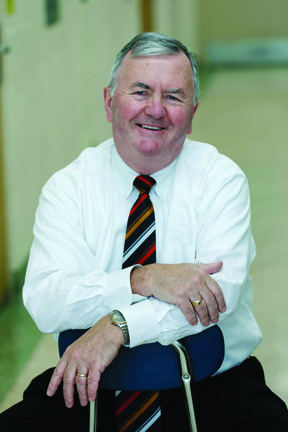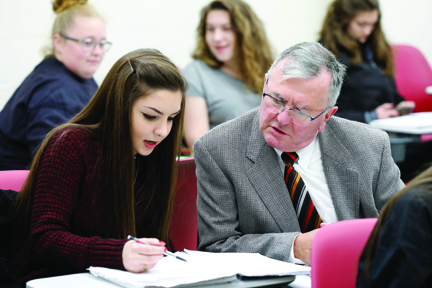Caldwell University
February 10, 2017
Bernie O’Rourke: An Irishman’s Passion for Business
When Professor Bernard O’Rourke plans the itinerary for a Business Division study-abroad experience, he takes a good hard look at the nation his students will visit. “Every country has a story,” he says. “I determine the essence of the country’s business to get its business zeitgeist.” He frames each trip so students can learn through an immersion in a nation’s economic and business life.
Since 2001, O’Rourke, associate dean of the Business Division, has led short-term trips to Belgium, Holland, Ireland, France, the Netherlands, the Czech Republic, Austria, Costa Rica, the Dominican Republic and Panama. In setting the agenda, he reaches out to government agencies, which are often eager to help with appointments that showcase a country’s economic profile and direction, and networks with business contacts.
In Costa Rica students toured a coffee plantation and a free-trade zone. In Panama they explored the iconic Panama Canal. In Austria they visited the Organization of Petroleum Exporting Countries. In the Czech Republic they saw the workings of the Skoda auto plant, which was regenerated when the country reverted to a free-market economy after overturning the communist regime. In the Dominican Republic they walked the floor of the Baldom food manufacturing company.
O’Rourke’s taste for international business and travel began when he was a young man in Ireland in the 1970s. He was eager to help his homeland. “What spurred me was the intent to move Ireland forward, to move it out of poverty,” he says. “Growing up in an impoverished region of Ireland, with little beyond farm and retail work available for most school leavers, I instinctively knew that Ireland needed to move forward with the times and somehow begin a new investment revolution to provide jobs for those who did not wish to emigrate to the U.K. or the U.S. as generations before had done.”
The vision for a new Ireland was provided by an aggressive investment promotion program in which Ireland scoured the world for state-of-the-art industries that could generate good-paying, export-focused jobs for the rising generation of well-educated Irish men and women. O’Rourke knew he had to be a part of the movement to regenerate Ireland and help create opportunities so the country might become prosperous and self-sustaining and not just a source of talented immigrants for the rest of the world. “It grabbed me and a lot of young people at the time,” he says.
He had received an undergraduate degree in economics with a political science minor from the biggest university in Ireland, University College Dublin, and then a law degree from King’s Inns, Ireland’s oldest school of law, qualifying him to go as far as pleading a case in the Irish courts. But practicing law was not his interest; he had a drive to work in international business to raise Ireland’s profile in the global marketplace.
EARLY LIFE

O’Rourke grew up in Inniskeen, a small village in County Monaghan just beside the border with Northern Ireland. The town was a farming community in the “traditional Irish countryside.” He and his seven younger brothers and sisters—one of whom drowned at the age of two—were raised by their Catholic parents, who encouraged education. O’Rourke and his siblings attended grammar school in a two-room schoolhouse with 60 students. His father, a miller, sold cornmeal products for farm animals, and O’Rourke learned on the family’s small farm how to gather potatoes and cut hay, barley, oats and wheat.
It was the 1950s, and he recalls how a few families in Inniskeen still rode horse-drawn carts to church on Sunday. Television became available when he was about 9 years old, but people had to “go 25 miles to the other side of the mountain” to pick up the hazy signals for British programs. “It was still amazing,” says O’Rourke. In his early teens Ireland’s Troubles were still years away, so he would ride his bicycle across the border into Northern Ireland “where we could get better and richer candies” and cheaper dairy products like butter. He was exposed to the “big city” of Dublin since the family frequently visited his grandparents there. After sixth grade he went to Castleknock College, a boarding prep school outside Dublin run by Vincentian priests.
FROM INTERNATIONAL BUSINESS TO HIGHER EDUCATION
After receiving his undergraduate and law degrees, O’Rourke worked for his father in Ireland for a short period, but it was “evident that times were changing in farming.” He took a legal position at the Irish Development Agency, hoping to bring foreign investors to the Emerald Isle to create jobs. The position gave him a “nice taste of travel,” he says, including a trip to Helsinki. Eventually he was offered a post in Manhattan. “I was given territory in New England and had to find any companies interested in manufacturing in Ireland, and the government agency would give them grants and tax benefits.” Then he began “chasing textile companies in the South.”
His professional journey next took him to managing Belleek china for the Waterford Crystal company where he gained legal, marketing and operational experience, learning to deal with computer software and to keep the books. He picked up his MBA along the way at Fordham and developed investments and marketing plans for Irish companies in America. After many years in business, O’Rourke started teaching international business at Fairleigh Dickinson University and found he enjoyed it. Doors opened for teaching at Caldwell, and he eventually made his way into higher education full time, sharing his multifaceted business experience with students.
O’Rourke has been a leader in advancing Caldwell’s Business Division, overseeing the department when it added programs including undergraduate degrees in financial economics, health care administration and sport management and master’s in accounting and in business administration.
He is excited about the significant increase in enrollment in the undergraduate programs and about the new programs, including the bachelor’s in health care administration, “a good fit because of our other health-related programs,” the bachelor’s in sport management and the new online MBA program. O’Rourke hopes that the division can take the impact of technology “to the next level” with enhanced programs in IT and that it can pursue more international students for the MBA program.
His experience in international business makes him value the contributions of the division’s Business Advisory Council, which provides a bridge between the business community and the university and is made up of senior executives and business owners.
The council provides networking opportunities for students and professors and forums for showcasing faculty and student research and best practices in business and mentorship. “We are fortunate that our Business Advisory Council members are supportive in facilitating student internships,” says O’Rourke.
Most rewarding for him is seeing students develop—“the progress they make over the semester and how they grow in understanding and relating to the world”—and then watching them receive their diplomas “when they are ready to go out into the world of business.”
O’Rourke is convinced Caldwell has something bigger schools don’t, citing as an example a student who was eager to leave for a big-time university but who transferred back to Caldwell after two months. “There will always be a need for the Caldwell ethos.”
“Every country has a story. I determine the essence of the country’s business
to get its business zeitgeist.”
THINGS YOU MIGHT NOT KNOW ABOUT PROFESSOR BERNIE O’ROURKE
As a young man working in Manhattan, he joined the New York Athletic Club rugby team—“a quick way to be integrated into a good group of people,” even playing in a tournament in the Cayman Islands.
He and his wife Sheila, Caldwell’s vice president for institutional effectiveness, have two grown daughters, one grandson, Ronan, and another grandchild on the way.
He served as president of the West Essex and Essex Fells school boards combined for nearly 16 years. “I ran three weeks after becoming a citizen. It helped me understand the school system.” He testified before Congress on behalf of the New Jersey School Boards Association.
Why we should visit his Ireland: “As my wife says, ‘It will always live up to your expectations.’ There are 40 shades of green. People really are fun to deal with and enjoy. The scenery is fantastic.

“It was almost a third world country when I was growing up. In the last 30 years, based on the economic development, it has become one of the richest countries in Europe. That’s not to say it doesn’t have its problems; it has many problems; it certainly suffered in the last recession.
“The party time and fun time—that exists as an authentic Irish experience.
“Everybody deserves to go at least once.”





